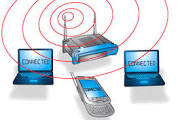 Wireless Vs Wired Networks
Wireless Vs Wired Networks
Wireless technology is becoming the trend in connecting devices. It has so many advantages to its popularity.
The cost is becoming marginal compared to traditional wired networks, bandwidth is accommodating higher speeds. Deployment is easier since there are no cables to run or holes to drill. All you need is an access point and wireless cards installed (Most new devices come with built-in wireless cards).
Also it allows older buildings to have network capabilities and accessibility. Wireless technology also provides flexible mobility. You are no longer bound by certain space or location. You can move your device within the scope of your network without any change in configuration.
Signal range expanders provide a longer range of connectivity.
In the other hand, while wireless connectivity has so many advantages, it is not for everyone. There are some limitations in implementing for some networks.
Some older buildings, walls stop wireless signal from reaching longer ranges. Even with range extender devices, signal is either weak or out of range.
In addition, some networks need data encryption. This translates into high bandwidth needs not accommodated by wireless signal therefore there is a signal loss.
Also while wireless signals use different frequencies, sometimes there is interference in the wireless signal resulting in signal loss as well.
In summary , wireless connectivity is an affordable and practical solution however it is not for everyone yet. To assess your network needs, it would be beneficial to consult with a network professional.
